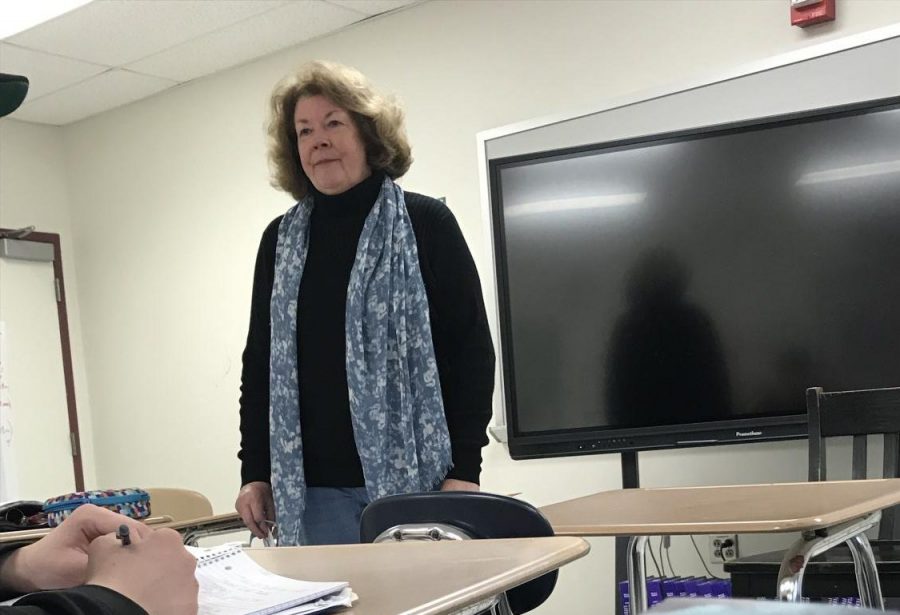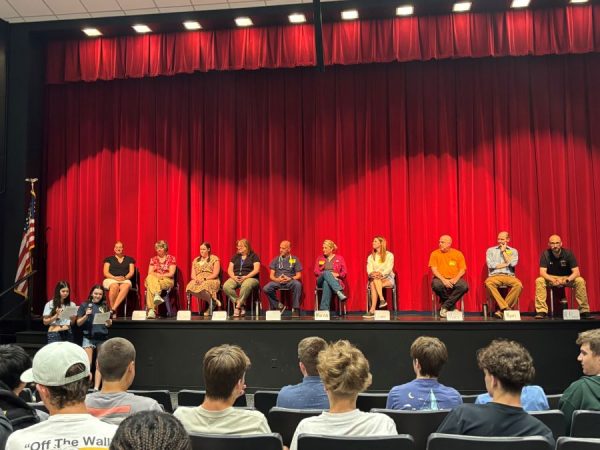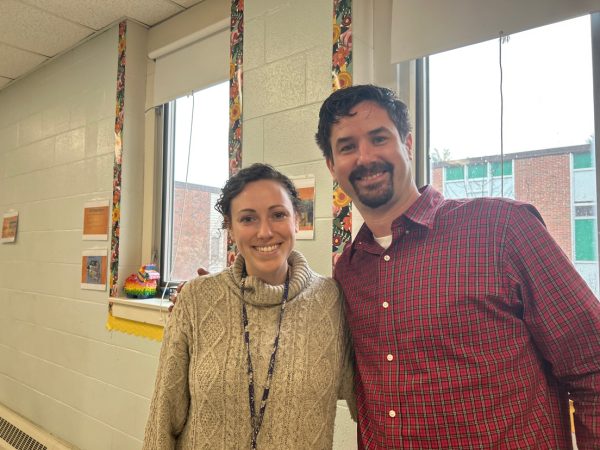A 40 Year Journey
You can catch her walking the halls of Goffstown High the morning of every “Even” day, with her tea and an iron fist of copies for first period. Mrs. Brown, the legend, enters room 202 to start her day. Mrs. Brown is a 26 year veteran of teaching at GHS with a total of 40 years teaching experience. She knows her way around the daily shenanigans of students trying to avoid the punishment for showing up empty handed and without their assignment. She refers lovingly to the 200 wing as “her hallway.”
An avid reader and literary fanatic, Mrs. Brown changed her college major from Mathematics to English after taking a Shakespeare class, where she “fell in love” with the compelling power of literature. That year when she returned home from college for Christmas break, she told her family about her decision to devote herself to the art of English and writing. “What happened then?” I asked her. “My father looked at me and said: ‘what are you going to do with English, Maureen?” So from that day forward–after some “gentle urges” from her father and sponsor–Mrs. Brown embarked on her journey to become a teacher.
A lover of intelligent conversations and thought-provoking discussions, she decided after student teaching at a middle school level, that literary analysis combined with the high school age group would “lend itself more to those kinds of adult discussions.” Her philosophy about English is rooted in the idea that critical and reflective thinkers of the literary world can go on to be some of the greater problem solvers of the modern world, and that you can teach students to think critically and do it independently through English.
As with any devout book lover, Mrs. Brown has several authors and books she holds near and dear to her heart, such as Harper Lee’s To Kill A Mockingbird, American giants such as Henry David Thoreau, and Dostoyevsky’s Crime and Punishment. Although she says the Brontë sisters will always hold a special place in her heart, with pieces such as Wuthering Heights and “Ah! Why, Because the Dazzling Sun”.
When asked what the most rewarding part about teaching was for her, she took a beat, then answered. “I can go back, in 40 years of teaching, and there have been times when students reached out…years later and said ‘Mrs. Brown, remember when you said…’ so it makes me think that students hear, even though there isn’t an immediate response”. Maybe it’s her appreciation and her dedication to her students that makes her such an impactful teacher.
Something Mrs. Brown remembers from her youth in grade school English class is how her peers–and herself–were only recognized for doing something wrong. As in, when constructing their writing and writing style, the only things being pointed out by the teachers were the flaws in what the students had produced, and never complimenting them on the admirable factors of their work. “I wish I could go back to my early years of teaching, when I was being mentored by people who wanted me to take five points off every time a student took a misstep, and I wish I had just believed in my inner voice.” It is a value that she tries to apply to her teaching, whatever class it may be.
Though the two grades she teaches couldn’t be more opposite in age, she notices a parallel between her English 9 Honors class (her first time teaching at the freshman grade level) and her AP Lit. class. “That’s the interesting part,” she says, “there is no difference”. She describes the two as “vertically aligned” in the complex discussions they initiate within the walls of the classroom.
The hardest part about teaching for Mrs. Brown are the instances when she believes she has failed to help her students get to a place of understanding, or when she hasn’t reached them as much as she wanted to. She tries to teach her students more than just English…to be young adults in today’s world. “I just want them to be open-minded. I just want them to listen, and I just want them to support their positions with data and not just an instinctive response. If I could just get them to realize how critical these four years are as they move forward.”

Veronica is a freshman at GHS. She is very involved with the Music and Performing Arts Departments, and loves to perform and be onstage. Some of her hobbies...









B. Iredale • Jun 4, 2018 at 10:29 am
I enjoyed your article. I know how much you appreciate her and enjoy being one of her students!